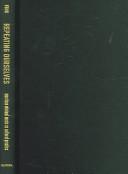| Listing 1 - 2 of 2 |
Sort by
|

ISBN: 1282358170 0520938941 1423727584 9786612358173 1598757857 9780520938946 9781423727583 9780520240360 0520240367 9780520245501 0520245504 9781598757859 9781282358171 6612358173 Year: 2005 Publisher: Berkeley : University of California Press,
Abstract | Keywords | Export | Availability | Bookmark
 Loading...
Loading...Choose an application
- Reference Manager
- EndNote
- RefWorks (Direct export to RefWorks)
Where did musical minimalism come from-and what does it mean? In this significant revisionist account of minimalist music, Robert Fink connects repetitive music to the postwar evolution of an American mass consumer society. Abandoning the ingrained formalism of minimalist aesthetics, Repeating Ourselves considers the cultural significance of American repetitive music exemplified by composers such as Terry Riley, Steve Reich, and Philip Glass. Fink juxtaposes repetitive minimal music with 1970's disco; assesses it in relation to the selling structure of mass-media advertising campaigns; traces it back to the innovations in hi-fi technology that turned baroque concertos into ambient "easy listening"; and appraises its meditative kinship to the spiritual path of musical mastery offered by Japan's Suzuki Method of Talent Education.
Music --- Minimal music --- Music and society --- Meditative music --- Minimalism (Music) --- Minimalist music --- Music, Minimal --- Repetitive music --- Systematic music --- Social aspects. --- History and criticism. --- advertising campaigns. --- america. --- american music. --- consumer society. --- cultural practices. --- disco. --- easy listening. --- hi fi technology. --- mass consumerism. --- mass media. --- minimal music. --- minimalism. --- minimalist aesthetics. --- music and culture. --- music historians. --- music studies. --- musical minimalism. --- musicians. --- musicology. --- nonfiction. --- philip glass. --- popular music studies. --- postwar america. --- repetitive music. --- revisionist account. --- steve reich. --- terry riley. --- united states. --- History and criticism --- Social aspects
Book
ISBN: 0472903004 0472039091 0472133284 9780472903009 Year: 2023 Publisher: Ann Arbor, Michigan : University of Michigan Press,
Abstract | Keywords | Export | Availability | Bookmark
 Loading...
Loading...Choose an application
- Reference Manager
- EndNote
- RefWorks (Direct export to RefWorks)
Minimalism stands as the key representative of 1960s radicalism in art music histories-but always as a failed project. In The Names of Minimalism, Patrick Nickleson holds in tension collaborative composers in the period of their collaboration, as well as the musicological policing of authorship in the wake of their eventual disputes. Through examinations of the droning of the Theatre of Eternal Music, Reich's Pendulum Music, Glass's work for multiple organs, the austere performances of punk and no wave bands, and Rhys Chatham and Glenn Branca's works for massed electric guitars, Nickleson argues for authorship as always impure, buzzing, and indistinct. Expanding the place of Jacques Rancière's philosophy within musicology, Nickleson draws attention to disciplinary practices of guarding compositional authority against artists who set out to undermine it. The book reimagines the canonic artists and works of minimalism as "(early) minimalism," to show that art music histories refuse to take seriously challenges to conventional authorship as a means of defending the very category "art music." Ultimately, Nickleson asks where we end up if we imagine the early minimalist project-artists forming bands to perform their own music, rejecting the score in favor of recording, making extensive use of magnetic type as compositional and archival medium, hosting performances in lofts and art galleries rather than concert halls-not as a utopian moment within a 1960s counterculture doomed to fail, but as the beginning of a process with a long and influential afterlife.
Minimal music --- History and criticism. --- Meditative music --- Minimalism (Music) --- Minimalist music --- Music, Minimal --- Repetitive music --- Systematic music --- Music --- Minimalism, early minimalism, Tony Conrad, Marian Zazeela, La Monte Young, Steve Reich, Philip Glass, Terry Riley, Glenn Branca, Rhys Chatham, authorship, music history, historiography, radicalism, leftist historiography, Jacques Rancière, drone, May '68, metonymy, Theatre of Eternal Music, punk, no wave, new wave, New York --- Authorship. --- Historiography. --- 1900-1999
| Listing 1 - 2 of 2 |
Sort by
|

 Search
Search Feedback
Feedback About UniCat
About UniCat  Help
Help News
News